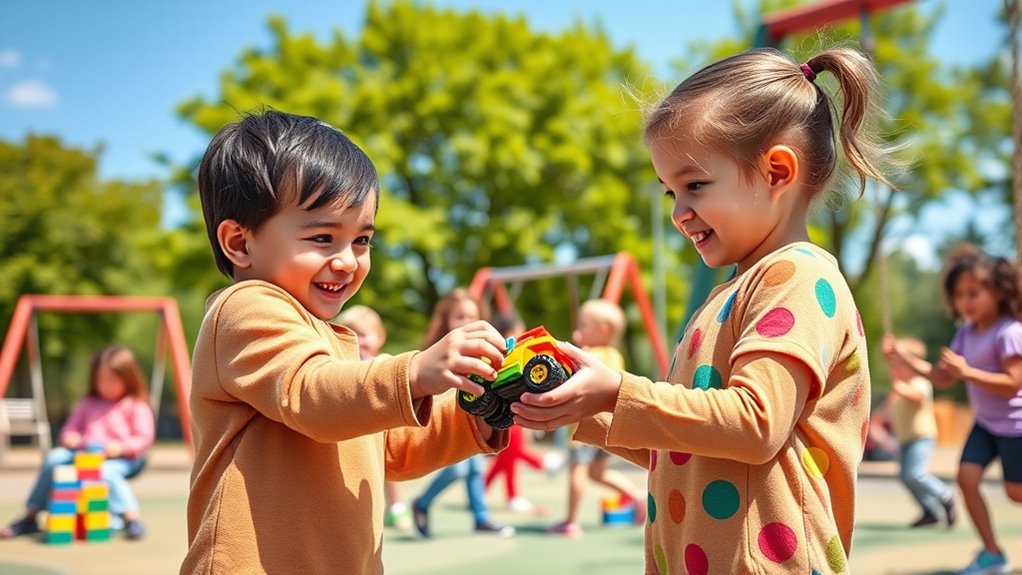To teach children sharing and cooperation through play, create fun activities like building with blocks or group storytelling that require teamwork. Encourage kids to ask for turns, listen, and communicate respectfully, praising their efforts along the way. Model cooperative behavior and gently guide children when challenges arise. By providing a safe space for practice and celebrating small successes, you help build their social skills. Keep exploring these strategies to foster ongoing growth and positive interactions.
Key Takeaways
- Use group play activities that require sharing and cooperation to develop social skills naturally.
- Encourage open communication and respectful requesting during sharing to promote understanding.
- Model cooperative behaviors and problem-solving to teach children how to work together effectively.
- Create a safe, positive environment that supports practicing sharing without fear of judgment.
- Reinforce successful sharing and cooperation with praise, building confidence and encouraging continued social engagement.

Play is a pivotal way children develop essential social skills. When you create opportunities for children to engage in play that emphasizes sharing strategies and cooperation activities, you help them learn how to navigate social interactions more effectively. These experiences teach children the importance of considering others’ needs, taking turns, and working together toward common goals. By guiding children through these activities, you foster a sense of empathy and patience, which are indispensable components of healthy relationships.
Introducing sharing strategies during play can be straightforward and fun. For instance, you might set up activities that require children to share toys or materials, such as building blocks or art supplies. As they navigate these situations, encourage them to communicate their needs and listen to others. Prompt them to ask questions like, “Would you like to use this too?” or “Can I have a turn after you?” This helps children learn how to express themselves clearly and respectfully. Reinforcing positive behaviors with praise when they successfully share or take turns boosts their confidence and encourages continued cooperation.
Set up sharing activities like building blocks to encourage communication and cooperation.
Cooperation activities are equally important in developing social skills. Engage children in group tasks that require teamwork, like completing a puzzle together or acting out a story. During these activities, you can emphasize the value of working collaboratively, sharing ideas, and listening to each other’s input. Model cooperative behavior by demonstrating how to compromise and resolve conflicts calmly. When disagreements arise, guide children to find solutions that satisfy everyone involved, fostering problem-solving skills and patience.
It’s essential to create a safe environment where children feel comfortable practicing these skills without fear of judgment. When you observe a child struggling with sharing or cooperation, step in gently to offer support and suggestions. For example, you might suggest taking a break or trying a different approach. Celebrating small successes reinforces the idea that sharing and cooperation are positive experiences, making children more likely to practice these skills independently. Additionally, exposing children to diverse social scenarios can broaden their understanding and adaptability in social interactions.
Frequently Asked Questions
How Can Parents Encourage Sharing at Home Effectively?
To encourage sharing at home effectively, you should model sharing behavior yourself and consistently demonstrate it in everyday situations. Establish routines that promote sharing, like taking turns with toys or snacks, so your child learns these habits naturally. Praise and reward their efforts to share, reinforcing positive behavior. By showing how sharing benefits everyone and maintaining regular routines, you help your child develop strong social skills that last.
What Are Common Challenges in Teaching Cooperation to Young Children?
When teaching cooperation to young children, you often face challenges like peer resistance and emotional regulation issues. Children might resist sharing or working together because they’re uncomfortable or overwhelmed. You need to be patient, model cooperative behavior, and help your child recognize and manage their emotions. Consistent practice and positive reinforcement encourage them to develop better cooperation skills, making social interactions smoother and more enjoyable for everyone involved.
How Does Play Influence Social Skill Development Across Different Ages?
Play greatly influences social skill development across ages by fostering peer interactions and emotional understanding. During play therapy, children learn to navigate social cues, share, and cooperate naturally. As you observe children engaging in play, you’ll see how it helps them build friendships, develop empathy, and improve communication skills. Play provides a safe space where children practice social behaviors, making it a crucial part of their social growth at every age.
Are There Specific Toys or Games That Promote Sharing and Teamwork?
Coincidentally, your choice of toys and game design can substantially promote sharing and teamwork. Opt for collaborative toys like building blocks, board games, or team-based games that require players to work together. These selections encourage communication, cooperation, and patience, making social skill development natural. When you select toys that foster interaction, you help children learn the value of teamwork while having fun, reinforcing positive social behaviors effortlessly.
How Can Teachers Address Conflicts During Cooperative Play?
When conflicts arise during cooperative play, you should encourage children to practice conflict resolution by calmly discussing their feelings and listening to each other’s perspectives. Use peer mediation to guide them toward understanding and compromise. As a teacher, model respectful communication, set clear expectations, and help children find solutions together. This approach promotes teamwork, empathy, and positive social interactions, transforming conflicts into opportunities for growth and learning.
Conclusion
By teaching sharing and cooperation through play, you open a world where your child’s social skills blossom like a vibrant garden bursting into full bloom. Every moment of guided play becomes a powerful seed, growing into lifelong friendships and understanding. Remember, your efforts can transform everyday interactions into extraordinary adventures, shaping a confident, kind-hearted individual who can navigate any social jungle. With patience and practice, you’re helping your child build the foundation for a lifetime of meaningful connections.










